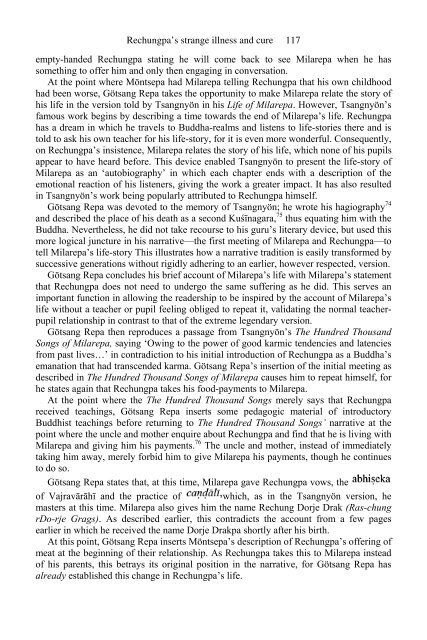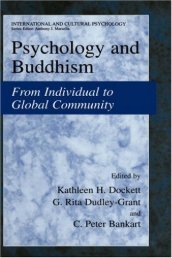The Biographies of Rechungpa: The Evolution of a Tibetan ...
The Biographies of Rechungpa: The Evolution of a Tibetan ...
The Biographies of Rechungpa: The Evolution of a Tibetan ...
Create successful ePaper yourself
Turn your PDF publications into a flip-book with our unique Google optimized e-Paper software.
<strong>Rechungpa</strong>’s strange illness and cure 117<br />
empty-handed <strong>Rechungpa</strong> stating he will come back to see Milarepa when he has<br />
something to <strong>of</strong>fer him and only then engaging in conversation.<br />
At the point where Möntsepa had Milarepa telling <strong>Rechungpa</strong> that his own childhood<br />
had been worse, Götsang Repa takes the opportunity to make Milarepa relate the story <strong>of</strong><br />
his life in the version told by Tsangnyön in his Life <strong>of</strong> Milarepa. However, Tsangnyön’s<br />
famous work begins by describing a time towards the end <strong>of</strong> Milarepa’s life. <strong>Rechungpa</strong><br />
has a dream in which he travels to Buddha-realms and listens to life-stories there and is<br />
told to ask his own teacher for his life-story, for it is even more wonderful. Consequently,<br />
on <strong>Rechungpa</strong>’s insistence, Milarepa relates the story <strong>of</strong> his life, which none <strong>of</strong> his pupils<br />
appear to have heard before. This device enabled Tsangnyön to present the life-story <strong>of</strong><br />
Milarepa as an ‘autobiography’ in which each chapter ends with a description <strong>of</strong> the<br />
emotional reaction <strong>of</strong> his listeners, giving the work a greater impact. It has also resulted<br />
in Tsangnyön’s work being popularly attributed to <strong>Rechungpa</strong> himself.<br />
Götsang Repa was devoted to the memory <strong>of</strong> Tsangnyön; he wrote his hagiography 74<br />
and described the place <strong>of</strong> his death as a second Kuśīnagara, 75 thus equating him with the<br />
Buddha. Nevertheless, he did not take recourse to his guru’s literary device, but used this<br />
more logical juncture in his narrative—the first meeting <strong>of</strong> Milarepa and <strong>Rechungpa</strong>—to<br />
tell Milarepa’s life-story This illustrates how a narrative tradition is easily transformed by<br />
successive generations without rigidly adhering to an earlier, however respected, version.<br />
Götsang Repa concludes his brief account <strong>of</strong> Milarepa’s life with Milarepa’s statement<br />
that <strong>Rechungpa</strong> does not need to undergo the same suffering as he did. This serves an<br />
important function in allowing the readership to be inspired by the account <strong>of</strong> Milarepa’s<br />
life without a teacher or pupil feeling obliged to repeat it, validating the normal teacherpupil<br />
relationship in contrast to that <strong>of</strong> the extreme legendary version.<br />
Götsang Repa then reproduces a passage from Tsangnyön’s <strong>The</strong> Hundred Thousand<br />
Songs <strong>of</strong> Milarepa, saying ‘Owing to the power <strong>of</strong> good karmic tendencies and latencies<br />
from past lives…’ in contradiction to his initial introduction <strong>of</strong> <strong>Rechungpa</strong> as a Buddha’s<br />
emanation that had transcended karma. Götsang Repa’s insertion <strong>of</strong> the initial meeting as<br />
described in <strong>The</strong> Hundred Thousand Songs <strong>of</strong> Milarepa causes him to repeat himself, for<br />
he states again that <strong>Rechungpa</strong> takes his food-payments to Milarepa.<br />
At the point where the <strong>The</strong> Hundred Thousand Songs merely says that <strong>Rechungpa</strong><br />
received teachings, Götsang Repa inserts some pedagogic material <strong>of</strong> introductory<br />
Buddhist teachings before returning to <strong>The</strong> Hundred Thousand Songs’ narrative at the<br />
point where the uncle and mother enquire about <strong>Rechungpa</strong> and find that he is living with<br />
Milarepa and giving him his payments. 76 <strong>The</strong> uncle and mother, instead <strong>of</strong> immediately<br />
taking him away, merely forbid him to give Milarepa his payments, though he continues<br />
to do so.<br />
Götsang Repa states that, at this time, Milarepa gave <strong>Rechungpa</strong> vows, the<br />
<strong>of</strong> Vajravārāhī and the practice <strong>of</strong> which, as in the Tsangnyön version, he<br />
masters at this time. Milarepa also gives him the name Rechung Dorje Drak (Ras-chung<br />
rDo-rje Grags). As described earlier, this contradicts the account from a few pages<br />
earlier in which he received the name Dorje Drakpa shortly after his birth.<br />
At this point, Götsang Repa inserts Möntsepa’s description <strong>of</strong> <strong>Rechungpa</strong>’s <strong>of</strong>fering <strong>of</strong><br />
meat at the beginning <strong>of</strong> their relationship. As <strong>Rechungpa</strong> takes this to Milarepa instead<br />
<strong>of</strong> his parents, this betrays its original position in the narrative, for Götsang Repa has<br />
already established this change in <strong>Rechungpa</strong>’s life.











